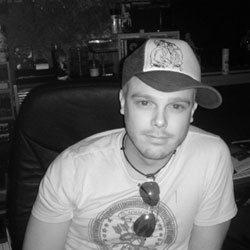Q&A: Justin Cortelyou Talks Engineering
Justin Cortelyou is an engineer and mixer based out of Nashville, Tennessee. Having engineered and mixed records for Taylor Swift, KISS, Ke$ha, Alice Cooper and Kristin Chenoweth, Justin began his career in the music industry working with Grammy Award-winning producers and engineers Bill VornDick and Chuck Ainlay. After working at Sound Stage Studios for two years in Nashville, he relocated to Los Angeles to team up with mix engineer Mike Shipley, who has worked for artists including Def Leppard, Shania Twain, Faith Hill, Nickelback and Maroon 5. Along with Mike, Justin also worked with The Wreckers, Rock Kills Kid, Nickelback and Maroon 5. After spending four years in Los Angeles, Justin moved back to Nashville with producer Tommy Henriksen. Not long after moving, he teamed up with legendary producer Bob Ezrin, who has worked with Pink Floyd, Alice Cooper, KISS and Peter Gabriel. With Bob Ezrin, Justin is currently mixing a record by The Darkness.
CCM Indie had the opportunity to talk with Justin about his career as an engineer, in addition to the importance that the engineering role plays in the music making process. We also touch on accompanying roles such as producing, mixing and mastering.
1. What is the difference between a Producer and an Engineer?
The producer is the person in charge. He makes the final decisions and guides the record through the creative process. The producer has the vision, and it’s the engineer’s job to make it happen. The engineer is in charge of the technical side along with making everything sound good. The engineer can also make production decisions (depending on the relationship with the producer), but the producer has the final say.
2. Why is an Engineer an important part of the process of making a record?
A good engineer will make a record sound amazing. It’s his job to choose the room he wants to record in (although this is sometimes decided by the producer), choose and place the microphones, edit together the takes, stay on top of file management and make the artist feel inspired. The engineer has a lot of dialogue with the artist and musicians, so he has to be able to understand their issues and relay information in a positive way.
3. Does a band or artist really need a Producer, or could they just hire an Engineer and make the record themselves? Do you have an opinion on why that’s a good or bad idea?
There have been many records either produced by the engineer, or engineered by the producer. While many times this works, I personally don’t believe it’s the best way to make a record. When I’m engineering, I am totally focused on the sound of every element, the headphone mix, watching the level to “tape,” and that sort of thing. It’s hard to have your brain switch gears and listen for arrangement and musicianship. What’s even better is to work with a producer or engineer team that really knows each other well. If there is that sort of relationship between the two, you’re going to get some great results.
Many times you hear of a band producing themselves. This seems like a good idea, but in my experience, it doesn’t always work the best. In order to do that, I believe the band has to have a few records under their belt. The record making process is very involved, and it requires a skill set that doesn’t come naturally. I think it’s very beneficial, especially for a young band, to have someone at the helm to steer the project in the right direction. It’s always good to have an objective voice, to be honest and give constructive criticism.
4. We’ve heard that in some cases, an Engineer does just as much (if not more) production than the Producer. Have you ever heard of or experienced this? Can you explain what that might be implying?
There really aren’t perfectly defined roles when making a record. Depending on the relationship between the producer and engineer, the engineer may be given the opportunity to add a lot of creative input. However, you do have certain occasions where the producer will drop the ball, and the engineer is the one to pick it up. I was in a session where I was a very green assistant engineer. The producer, engineer and manager left the studio, but the vocalist wanted to continue. So, after staying silent and watching the artist struggle with her vocal, I jumped in and started producing the vocal. It turned out to be a good thing…she fired her staff and hired me to engineer the rest of her record. Also, I’ve run across some very hands-off or inadequate producers that don’t say much, and I’ve had to step up and direct the musicians, or make crucial edits or decisions to the song.
The engineer has his hands on every track, every fader, and knows the material inside and out. So, many times the engineer ends up making many of the decisions on the record just due to that fact.
5. Explain the different types of Engineering: Tracking, Mixing, Mastering, etc.
Tracking is when you have the band or session musicians in the studio and you record everything at once. With the advent of the digital workstation and the use of home studios, the typical scenario is to book a commercial studio to record “bed tracks” – or drums, bass and maybe some guitars. After those are cut, you typically go to a smaller studio (or home studio) to really focus on the overdubs. This may be additional guitars, percussion, steel guitar, fiddle, acoustic guitar and vocals. Here you can really hone in on getting the parts right without blowing your budget on a big studio.
After everything is recorded, it’s time for editing, vocal comping and tuning. Here’s where you take the raw product and really enhance or fix the performance. Pop songs typically have heavy editing and tuning, while more organic records spend less time in this process.
When all is recorded, pocketed and tuned, it’s time for mixing. This is where the engineer takes each track and gets the balances, sounds and effects. This is arguably the most important step in the recording process. A good mix will take the entire record to a new level, while a bad mix can completely destroy the record.
After the mix engineer is finished and the producer or band signs off on the mixes, the files then go to the mastering engineer. This is where all of the songs are matched level wise and sonically. The mastering engineer (along with the producer) also sets the sequence and the timing in between the songs.
6. At what point do each of these Engineers’ responsibilities start and stop?
This depends on whether the same engineer is tracking, overdubbing and mixing, or if there are separate engineers for each stage. Let’s take the latter for instance. The tracking engineer is finished after all tracking dates are completed. He will generally work anywhere from a couple days to a week or so, depending on the budget and size of the project. The overdub engineer is finished when all overdubs are done and usually is the same person doing the editing and possibly the tuning. His final responsibility (barring any issues in the mix) is to organize the session so that the mix engineer will know where all the tracks are. This includes proper labeling, color coding and printing any important FX or synthesizers. The mix engineer typically is just given the organized tracks in whatever program or format they are comfortable with. Some mixers will send a list of delivery requirements, and it is the tracking or overdub engineer’s responsibility to meet these requirements. Once a mix is signed off, the mixer will print any versions (typically a track with no lead vocal for any TV appearances, an instrumental, a vocal-only version and a version with the vocal a little higher in the mix) and send all of those to the mastering engineer. The mastering engineer is the last in the line.
7. There are some very successful Producers that choose to Engineer themselves rather than hiring out. Have you ever Produced a project that you’ve also Engineered? Is that something you would like to do more of?
I am currently producing and engineering a project. It’s nice to wear a different hat, but it is a bit tricky. I feel like doing one or the other is the way to go. I think my production suffers a bit when I’m also working on songs and worrying about technical issues. My goal is to be a top mixer. I enjoy producing, but on a smaller scale for fun. I don’t really have any desire to be a producer. I love the art of mixing. It’s a giant sonic puzzle to sort out.

 Listen Live
Listen Live
Leave a Reply
You must be logged in to post a comment.